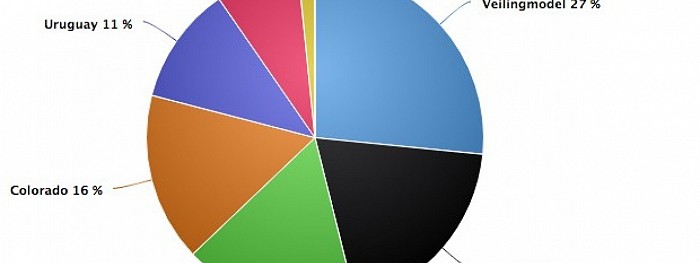Welke andere modellen zijn er?
De negen modellen die we presenteren zijn niet de enige modellen die er bestaan voor de regulering van cannabis, maar we moesten een keuze maken. We hebben het idee dat we nu de grootste actuele discussies hebben weten te vangen in een overzichtelijk, contrastrijk aantal.
Er zijn in de loop der jaren natuurlijk nog wel meer modellen de revue gepasseerd. Hier alvast een korte opsomming van enkele andere ideeën die in de afgelopen jaren zijn voorgesteld. Mochten er in de toekomst andere modellen zijn die een plek verdienen in de lijst, dan kunnen we die later toevoegen.
Canadees Framework
De Canadese Taskforce voor legalisering en regulering van cannabis presenteerde hun aanbevelingen aan de Candese overheid op 13 december 2016. Het uitgebreide rapport bevat negen kernpunten en zet uiteenlopende aanbevelingen uiteen in relatie tot productie, verkoop, consumptie en meer. Een samenvatting van deze interessante ontwikkeling staat hier aangegeven.
Tilburgs kweekconvenant
Het medicinale cannabisbeleid lijkt geregeld, maar de praktijk is anders. Veel patiënten die medicinale cannabis op doktersrecept via de apotheek krijgen geven aan dat de gesteriliseerde Bedrocan soorten niet voldoen, en daarom geven ze aan dat ze buiten de apotheek naar een alternatief zoeken. Onder andere via coffeeshops maar ook via thuisteelt. Onlangs heeft een Tilburgse stichting een succesvol verzoek ingediend bij burgemeester Noordanus om het thuis kweken van cannabis voor medicinale toepassing mogelijk te maken. Meer informatie hierover staat hier.
Initiatiefwet gesloten coffeeshopketen
Onlangs heeft er zich een kamermeerderheid afgetekend voor een wetsvoorstel van D66 die de gereguleerde teelt ter bevoorrading van coffeeshops mogelijk zou moeten kunnen maken. Het model trekt het gedoogbeleid door naar de achterdeur, waardoor het nog steeds illegaal is maar toch mag. Hoe dat werkt - is nog onduidelijk. Lees hier meer over het voorstel van D66.
VNG werkgroep
Op initiatief van een aantal gemeenten die ook betrokken zijn geweest bij het Joint Regulation manifest is een tijdelijke bestuurlijke werkgroep in het leven geroepen binnen de Vereniging tbv een update van het cannabisbeleid. Dat heeft geleid tot het laten opstellen van een rapport en een position paper, die op een VNG congres door 89,5% van de Nederlandse gemeenten is onderschreven, in deze verdieping is te lezen wat daarbij de speerpunten zijn.
Onderzoek Heerlen
In Heerlen is nav een aangenomen raadsmotie over de regulering van de wietteelt een praktijkonderzoek uitgevoerd waarbij een business-case is beschreven. Daarbij is uitgegaan van een integrale aanpak vanuit vier stappen: preventie, repressie, nazorg & regulering. In het onderzoek worden 14 wietsoorten genoemd die via een gecontroleerde toelevering aan coffeeshops in Heerlen zouden kunnen worden geleverd. Er was aandacht voor bedrijfseconomische eisen, veiligheidseisen en voor de juridische haalbaarheid. Lees hier meer over dit initiatief.
Model Crone
In dit model, vernoemd naar de burgemeester van Leeuwarden, reguleren de verkooppunten de teelt, kwaliteitscontrole, distributie en de verkoop van cannabis. Het gedoogbeleid wordt dus uitgebreid naar de teelt. Burgemeester Crone zei hierover: 'Het vrijgeven van de handel kan niet, maar verbieden heeft ook geen zin. Door het doortrekken van de gedoogconstructie naar de achterdeur, kunnen we het ook monitoren'. Lees hier meer over zijn ideeën.
De transparante keten
Op 30 oktober 2013 werd het congres 'de transparante keten' op initiatief van Stichting Epicurus en het Trans National Institute georganiseerd in Utrecht. Dit om het debat over het organiseren en controleren van de achterdeur van de coffeeshop op de maatschappelijke en politieke agenda te zetten, te meer Amerikaanse staten daar wel een aanvang mee hebben gemaakt, in Uruguay het parlement met legalisering instemde en in Spanje cannabis social clubs uit de grond schieten. In deze verdieping is hierover meer informatie te vinden.








